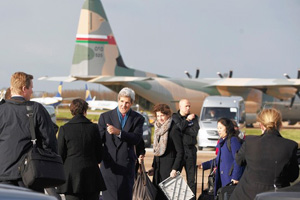 Wall Street Journal: The Obama administration is mounting an aggressive campaign to head off new congressional sanctions against Iran, arguing they would jeopardize the high-stakes deal sealed this past weekend to curb Tehran’s nuclear program.
Wall Street Journal: The Obama administration is mounting an aggressive campaign to head off new congressional sanctions against Iran, arguing they would jeopardize the high-stakes deal sealed this past weekend to curb Tehran’s nuclear program.
The Wall Street Journal
By Carol E. Lee , Peter Nicholas
 WASHINGTON—The Obama administration is mounting an aggressive campaign to head off new congressional sanctions against Iran, arguing they would jeopardize the high-stakes deal sealed this past weekend to curb Tehran’s nuclear program.
WASHINGTON—The Obama administration is mounting an aggressive campaign to head off new congressional sanctions against Iran, arguing they would jeopardize the high-stakes deal sealed this past weekend to curb Tehran’s nuclear program.
After arguing for weeks that sanctions would hurt the prospects of reaching a deal, senior administration officials are now asking lawmakers to hold off for another six months while negotiators try to achieve a long-term accord.
The administration is taking steps to burnish the agreement, casting it as the alternative to Mideast conflict. And enforcement officials, seeking to counter arguments that the interim deal signed Sunday in Geneva would erode punitive economic sanctions, publicly warned any business, bank or broker against trying to do prohibited business with Iran.
Meanwhile, doubts over the Iran deal emerged in oil markets, which bucked expectations that it would lead to cheaper crude. Traders initially pushed oil prices lower Monday, but later erased much of the fall amid worries over the substantial risks for a diplomatic solution.
In an indication of the importance of the agreement to his agenda, President Barack Obama will devote significant focus to the diplomatic effort in his State of the Union address shortly after the new year, a senior administration official said.
During a speech in San Francisco Monday, Mr. Obama recalled his campaign promise to pursue diplomacy over conflict, but also insisted the U.S. has gone into negotiations with Iran “clear-eyed” as it drives toward a permanent deal in coming months.
“Huge challenges remain,” Mr. Obama said in San Francisco. “But we cannot close the door on diplomacy, and we cannot rule out peaceful solutions to the world’s problems.”
He added, “Tough talk and bluster may be the easy thing to do politically, but it’s not the right thing for our security.”
Still, the Iran agreement has done little to deter staunch supporters of new sanctions, such as Sen. Chuck Schumer (D., N.Y.), from pushing for legislation, forcing the White House to redouble its campaign to counter the influence of Democratic Party leaders. Some lawmakers found irony in the alliances formed at home and abroad by those opposing the agreement.
“The Obama administration has managed somehow to bring the Arabs and Israelis together and they may have created bipartisanship at a time when I thought it was impossible,” said Sen. Lindsey Graham (R., S.C.), assailing the agreement in an interview. “The deal does not accomplish the goal of beginning to dismantle the [Iranian nuclear] program.”
A possible compromise circulating in Congress is sanctions legislation that wouldn’t take effect until after the initial six-month period of the Iran agreement, and only if the final accord didn’t meet certain benchmarks.
However, the White House, coordinating with other nations involved in the negotiations, doesn’t want any new sanctions adopted—even those that might not take effect for an extended period because it feels it will poison the negotiating environment, senior officials said.
“The international community is now invested in the six-month negotiations,” a senior administration official said. “If we did anything that made it look like we’re not taking that window seriously or are moving prematurely to pressure, we could jeopardize the international unity both in the negotiations and in the enforcement of the sanctions regime.”
The official added: “This is very high stakes diplomacy, and we want the leverage of additional sanctions hanging out there but we need to take the guidance of our negotiators about what would help or hurt.”
White House officials acknowledge Mr. Obama faces a challenge in forging a final Iran pact, which also faces resistance from U.S. allies such as Israel and Saudi Arabia.
Mr. Obama’s troubled relationship with Capitol Hill places him at a disadvantage. Republicans have given him few legislative victories since taking control of the House two years ago, and members of both parties have shown a willingness to join forces to block Mr. Obama’s efforts to gain support for foreign policy initiatives—most recently, military intervention in Syria.
The Iran agreement could produce a needed foreign policy breakthrough for a president who has seen his domestic agenda stall. Since his second term began in January, Mr. Obama has failed to make progress on an immigration overhaul, a minimum-wage increase or any of the other domestic priorities he has embraced.
A permanent deal that scraps the Iranian nuclear program would amount to a historic achievement that eluded his predecessors, potentially giving his White House new second-term momentum.
One challenge facing Mr. Obama is in persuading Senate Majority Leader Harry Reid (D., Nev.) to scrap a new sanctions bill. Mr. Reid has been a strong supporter of tougher sanctions against Iran, but he is also Mr. Obama’s top ally on Capitol Hill and often has maneuvered the Senate agenda to back the president.
Mr. Reid said last week he was committed to moving forward with an Iran sanctions bill in early December, after Thanksgiving break. After the Iran deal was struck in Geneva early Sunday, Messrs. Obama and Reid spoke, and on Monday, the Senate Democratic leader appeared to soften his stance.
“When we come back, we will take a look at this to see if we need stronger sanctions,” Mr. Reid said in an interview with NPR. “But we all have to acknowledge that it’s an important first step.”
House Speaker John Boehner (R., Ohio) has asked the White House to brief all House lawmakers next week when they return from Thanksgiving break. Secretary of State John Kerry plans to appear on Capitol Hill next week for meetings with lawmakers, officials said.
Mr. Obama is also trying to persuade lawmakers who are under pressure from Israeli officials, including Prime Minister Benjamin Netanyahu, who lobbied for far stronger terms with Iran and have considerable sway with U.S. lawmakers. The White House held a briefing Sunday specifically for Jewish lawmakers.
“This is going to consume a lot of effort over the next six months,” the senior administration official said. “This is a huge piece of business, and I think that whether it’s talking to allies, whether it’s talking to the Hill or talking publicly, he will be heard.”
For now, the administration could benefit from the legislative calendar, which makes it difficult to pass new sanctions by year’s end.
The interim accord requires Iran to halt key elements of its nuclear program and curtail portions of it. In return, the U.S. and world powers agreed to give Iran access to funds frozen overseas and to ease some of the economic sanctions that have stifled the country’s economy in recent years. “There may be light at the end of the tunnel, but it’s a long tunnel,” said a senior Treasury official. “So any business, any bank, any broker, anybody who thinks it’s open season to go into Iran today I think is sorely mistaken. We will enforce these sanctions and if someone thinks…it’s time to jump back into Iran with both feet, they’re just wrong.”
On Monday, the European Union moved quickly to implement Sunday’s nuclear accord, saying it expects to ease sanctions on Iran in January, senior EU officials said.
Restrictions on trade in petrochemical products, auto parts and aircraft components will be eased in the agreement. Those steps have given rise to fears that the international powers in the deal are approving resumption of business with Iran, undermining years of painstaking sanctions.
Countering such perceptions, the U.S. Treasury Department is warning against violations of strict prohibitions.
–Jay Solomon, Michael R. Crittenden, Keith Johnson, Jeffrey Sparshott and Inti Landauro contributed to this article.


